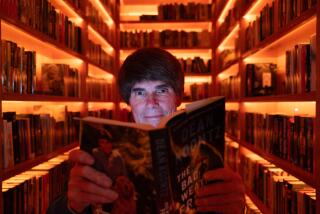Elif Batuman turns her gifts to fiction in ‘The Idiot’
With her smart and deliciously comic 2010 debut, the essay collection “The Possessed,” Elif Batuman wrote one of the 21st century’s great love letters to reading. Ostensibly orbiting an academic cottage industry devoted to the mighty Russians — Tolstoy, Dostoevsky, Chekhov, et al. — her true quarry proved to be the splendid gifts hidden within the creaking edifice of literature itself, a catalog of absurdities, yes, but also of uncanny and utterly contagious enthusiasms. It was a tour de force intellectual comedy encasing an apologia for literary obsession. “I stopped believing that … it was possible to compromise something you loved by studying it,” Batuman wrote. “Was love really such a tenuous thing? Wasn’t the point of love that it made you want to learn more, to immerse yourself, to become possessed?”
A different — though no less tenuous — variety of possession is explored in “The Idiot,” Batuman’s first novel. Selin, the 18-year-old daughter of Turkish immigrants, is beginning her first year at Harvard. It’s 1995, and the connective tissue of technology is only just beginning to demonstrate its capacity for dread and magic. (“What do we do with this, hang ourselves?” Selin asks after being handed an Ethernet cable for the first time.) That newfangled platform known as email is especially troubling to our protagonist, creating a kind of Russian nesting doll of anxiety: “Each message contained the one that had come before, and so your own words came back to you — all the words you threw out, they came back.”
Email is also the medium that propels Selin’s infatuation with Ivan, an older mathematics student from Hungary. After sitting in on the same language class, they begin an elliptical, largely electronic correspondence (the very “Harvard Freshman” topics include stars, chaos and the Sapir-Whorf hypothesis). Selin agonizes over the attention she pays the increasingly intimate missives, even as she attempts to justify her obsession. “Why was it more honorable to reread and interpret a novel like [Balzac’s] ‘Lost Illusions,’ ” she wonders, “than to reread and interpret some email from Ivan?” A classic Batuman deadpan; still, the first wooziness of campus romance registers as authentic. “I felt dizzy from the intimacy and remoteness,” Selin says. “Everything he said came from so thoroughly outside myself. I wouldn’t have been able to invent or guess any of it.”
For this reader, though, the book’s pleasures come not from the 400-page, low-and-slow smolder of its central relationship, which can at times feel like nothing more than two repressions circling one another; rather, it is Selin herself. Acutely self-conscious but fiercely intelligent, she consistently renders a strange, mordantly funny and precisely observed world. Champagne bottles “lay on their bellies like black dogs with wire muzzles.” Suspended over a pond is “the quivering molten yolk of the sun.”
It is difficult not to see a young Batuman in Selin, despite the well-documented dangers of ascribing an author’s characteristics to her characters. The novelist and New Yorker staff writer is also Turkish, and a Harvard alumna.
Selin also shares her creator’s interest in the labyrinth of language, its potential for both clarity and confusion. As yet only vaguely aware of her calling to be a writer, she enrolls in a number of classes on linguistics and the philosophy of language. Batuman is wonderful here, stripping down abstruse theory to show how the structures of language often dictate — even restrict — the ways in which we’re able to relate to one another. Of a particular verb tense in Turkish, she writes, “it was a curse, condemning you to the awareness that everything you said was potentially encroaching on someone else’s experience, that your own subjectivity was booby trapped and set you up to have conflicting stories with others.” (This could have been lifted from a Batuman essay.) These fragmented associations comprise a portrait of the young artist as she discovers the uncertainty of her tools: “There was no way to go through life, in Turkish or any other language, only making factual statements about direct observations. You were forced to use [the inferential tense], just by the human condition — just by existing in relation to other people.”
Language also frames the book’s second half, as Selin takes on a summer job as an English tutor in a remote Hungarian village. While there are memorable scenes — a semi-grotesque child pageant Selin is asked to judge, a bucolic canoe ride with Ivan — the pacing flags. I missed the spark and crackle of campus life, Selin’s surgical deflating of puffed-up professors, the ice-shagged streets of Boston. Batuman allegedly worked on the novel off and on for more than a decade, and it shows here in a certain incongruity of affect. The many surrogate Hungarian families she spends time with are sometimes charming but tend to blend into a murky composite, and the denouement with Ivan is suitably equivocal but not particularly satisfying.
Still, Selin’s is a consciousness one does not want to part with; by the end of the book, I felt as if I were in the presence of a strange, slightly detached, utterly brilliant friend. “I kept thinking about the uneven quality of time,” she writes, “the way it was almost always so empty, and then with no warning came a few days that felt so dense and alive and real that it seemed indisputable that that was what life was, that its real nature had finally been revealed.” Batuman articulates those little moments — of revelation and of emptiness — as well as anyone writing today. The book’s legacy seems destined to be one of observation, not character — though when the observer is this gifted, is that really any wonder?
Illingworth is a writer in Southern California. His work has appeared or is forthcoming in the Atlantic, the Times Literary Supplement and the Los Angeles Review of Books.
::
Elif Batuman
Penguin Press: 432 pp., $27
More to Read
Sign up for our Book Club newsletter
Get the latest news, events and more from the Los Angeles Times Book Club, and help us get L.A. reading and talking.
You may occasionally receive promotional content from the Los Angeles Times.






